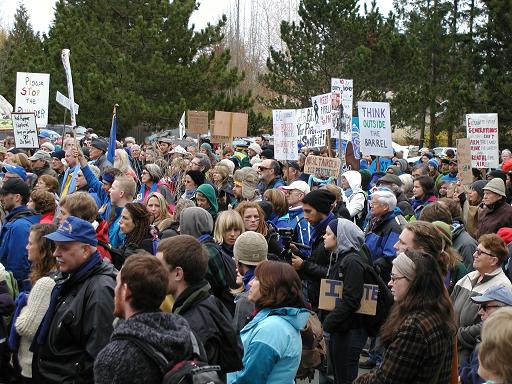Speaker after speaker poured out their passionate pleas to an impassive panel at the Enbridge Northern Gateway Pipeline hearings in Comox, B.C., on March 30 and 31. Some described in loving detail their oceanside worlds and the terrible weather on the north coast. Others discussed the economics (risk versus benefit) of the 1,170-kilometre pipeline from Alberta to Kitimat, B.C., where the diluted bitumen would be loaded on tankers to travel the narrow passages of B.C.’s west coast Great Bear Rainforest. A few short-term construction jobs, no royalties, and the enormous financial and ecological risk of oil spills on land and sea, in order to provide oil to Asia do not add up for British Columbians of most walks of life.
Brian Voth, a forest worker from North Island, described the beauty of San Josef Bay. “If it was fouled by an oil spill, that would break my heart,” she said, and concluded, “If there was an oil spill, the broken hearts would be piled higher than high.”
The reasoning was powerful. Kathy Smail from Cortes Island pleaded: “The environment is not a stand-alone subject. As we all know, shifts in the environment alter everything around us. Our economies, our health, our social well-being, our cultures. As our earth warms and our weather changes and our propped up economic house of cards collapses, what we could have left is the safety net of a relatively intact environment that shelters and nourishes us. It is hopelessly optimistic of me to even wish for such things but I am compelled by my grandchildren, my community, and the uncertain future for all creatures to strive for this. I implore you to do whatever you are able to halt the Northern Gateway Project.”
Outside the hearing room on a chilly Saturday afternoon, over 2,200 islanders rallied, cheering, singing, and promising that their resistance and support of First Nations would be strong. They came from one end of Vancouver Island to the other, from Port Hardy to Victoria, to be a part of the “Our Coast, Our Decision — No pipelines, No tankers” rally. They drummed, they cheered the dancers from the Ko’moks First Nation, they stood in awe listening to Ta’Kiaya, the 11-year-old singer from Sliammon across the water in Powell River. Their signs expressed the same range of thoughts and feelings as the speakers inside. Many protested the threat of oil spills. One sign read “Big Steve, Keep your Pipeline in your Pants.” Artists from the community had spontaneously pitched in with beautiful signage, and some people unconnected to the rally organizers hung a 30-foot banner at the bridge to Comox reading “No Pipelines, No Tankers.”

It was clear that everyone present understood completely what was at stake, and that this was a great tribal rising in its own right. On Friday afternoon, the panel had threatened to shut down one speaker, David Cutts, who announced that he was speaking as a member of the “Veterans of Clayoquot Sound” — those who were arrested and jailed at the mass protest in the 1990s, — in his prediction that approval of the pipeline would unleash a “huge amount of turmoil” as construction had to pass through dozens of First Nations’ territories. It would be a civil insurrection from all walks of life. “People would die,” said Cutts.
The crowd in Comox understood the stakes. Several speakers talked about this struggle as a historical cusp for British Columbia. The crowd poured out their heart in the cheers. They also made it abundantly clear that they would support the First Nations all the way — that the looming threat to the coast, the salmon and the people would be contested in every way possible.
Photos by Fireweed of the impressive signage can be seen at: http://www.flickr.com/photos/byfireweed/sets/72157629713704133/
And by Rosemary Baxter at: http://project-pipeline.org/2012/04/01/comox-rally/
Delores Broten is Editor of the Watershed Sentinel.




